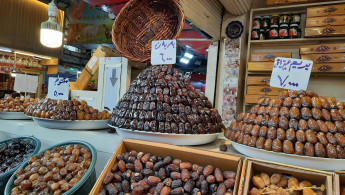Iraq's top court shelves controversial bill on food security
Iraq's federal court, the country’s supreme judicial authority, on Sunday ruled out against a bill proposed by the Iraqi government to urgently deal with skyrocketing food prices, as the country struggles to pass a budget law due to the political deadlocks.
Mustafa al-Kadhimi, prime minister of the Iraqi caretaker government, has sent the draft bill of Emergency Support for Food Security and Development to the parliament in March in order to have the power to spend money and deal with the issue of rising food prices.
The parliament made the first reading to the Emergency Support for Food Security and Development draft law, but there were different views by the parliamentary blocs over the bill.
“The biggest issue regarding the bill was that it has been proposed by a caretaker government that does not have the power to send draft laws to the parliament, this the main reason why this bill has been rejected by Iraq's federal court,” Jamal Kocher, Iraqi lawmaker from the Kurdistan Islamic Union (KIU) and member in the parliament's finance committee told The New Arab in a phone interview.
According to the binding laws, the Iraqi government cannot spend any money without legal permission. The Iraqi parliament has yet to pass the law on the country’s budget for 2022 due to political conflicts.
Iraq’s President Barham Salih on 12 May asked the court to clarify the duties of the caretaker government, in the case of a dissolution of parliament. In response, Iraq's federal court on Sunday clarified that according to the provisions of Iraq’s constitution, caretaker governments cannot propose bills to the parliament, rendering the bill illegal.
The controversial bill has been heavily criticised for opening doors towards big financial misconduct in a country with a rampant history of corruption.
“A large amount of money, up to 35 trillion Iraqi dinars ($23bn), from the surplus monthly oil sales, had been proposed in the bill to deal with the issue of inflation in food prices. Had the bill been passed, it could deal with the inflation issue to a great extent,” Kochar said.
“But the bill smells of major corruption, as the case for all amounts of money in the Iraqi state, there are wide gates for corruption.
“Despite all these controversies over the bill, it has been an opportunity to deal with several crises including rising food stuff, shortages in electricity and drinking water, and paying the farmers for selling their crops to the government.”
Following the court’s verdict, al-Kadhimi said in a statement that "The Iraqi government confirms its full respect for the constitutional texts and timings, binding laws, and fatwas issued by the Federal Supreme Court to interpret these texts.”
He stressed that the bill would have supported social welfare to “protect the poor and needy classes in the face of the global economic crisis, provide services in cities, provide job opportunities for graduates and the unemployed, as well as provide urgent funds to support the agricultural sector and deal with climate changes."




 Follow the Middle East's top stories in English at The New Arab on Google News
Follow the Middle East's top stories in English at The New Arab on Google News


![A group of Palestinians, foreign and Israeli activists gather to participated in an olive picking event on the land in the town of Battir, which is under threat of confiscation by Israel in Bethlehem, occupied West Bank on 8 November 2024. [Getty]](/sites/default/files/styles/image_330x185/public/2182930803.jpeg?h=199d8c1f&itok=__0LgGsa)